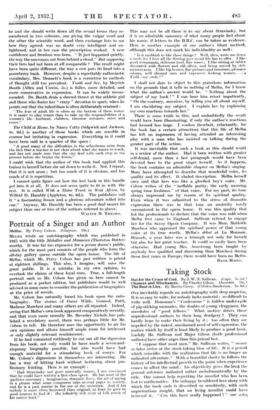Portrait of a Singer and an Author
Melba. By Percy Colson. (Grayson. I Ss.) MELBA wrote an autobiography which was published in 1025 with the title Melodies and Memories (Thornton Butter- worth). It was far too expensive for a prima donna's public, which for the most part consists of the people who form the all-day gallery queue outside the opera house. The life of Melba, which Mr. Percy Colson has just written is priced at eighteen shillings. This also, I imagine, will miss the great public. It is a mistake, in my own opinion, to overlook the claims of these loyal ones. True, a full-length portrait such as Mr. Colson has given us here cannot be produced as a pocket edition, but publishers would be well advised in some cases to consider the publication of biographies at the price of novels.
Mr. Colson has naturally based his book upon the auto- biography. The stories of Oscar Wilde, Gounod, Putti, Madame Marchesi and many others are all repeated. Indeed, seeing that Melba's own book appeared comparatively recently, and that even more recently Mr. Beverley Nichols has pub- lished a revelatory novel, there was perhaps little for Mr. Et' ilson to tell. He therefore uses the opportunity to air his own opinions and allows himself ample room for irrelevant or only slightly relevant reminiscence.
If he had consented ruthlessly to cut out all the digression from his book, not only would he have made a seven-and- sixpenny biography possible, but also would have had enough material for a stimulating book of essays. For Mr. Colson's digressions in themselves arc interesting. Ile has a way of hitting hard without bothering about pre- liminary feinting. Here is an example : " Had Stravinsky not gone musically insane, I am convinced that he could have written a first-class opera. He has most of the qualities necessary ; imagination, dramatic force, the art of saying in a phrase what some composers take several pages to convey, runt he is a past master in the use of the orchestra. And if his melody is more often borrowed than original, at least he goes to good sources to find it : the infinitely rich store of folk music of his native land." This may not be all there is to say about Stravinsky, but it is an admirable summary of what many people feel about his music, if letters to the B.B.C. can be taken as evidence. Here is another example of our author's blunt method, although this does not mark his individuality so well :
" Is it snobbish to like these things Well, then, write me down
a snob, for I love all the fleeting joys social life has to offer. I like good restaurants, delicious food, fine wines ; I like sitting at tables decorated with flowers and old silver, and being served by deft menservants. I like big houses, fine pictures and furniture, pleasant odours, well dressed men and expensive looking women. . .
moild—my credo !"
I Quill not dare to object to this gratuitous information on the grounds that it tells us nothing of Melba, for I know what the author's answer would be. " Nothing about the subject of my book !" I can hear l• retort impatiently, " On the contrary, monsieur, by telling you all about myself, I and elucidating my subject. I explain her by explaining my own reactions towards her."
There is some truth in this, and undoubtedly the result would have been illuminating, if only the author's reactions had loomed less large. I confess (howbeit, reluctantly, for the book has a certain attraction) that this life of Melba has left an impression of having attended an interesting play with a man who has insisted on talking during the greater part of the action.
It was inevitable that such :t book as this should result in a review of the author. Had it been written with greater self-denial, more than is last paragraph would have been devoted here to the great singer herself. As it happens, the book contains an admirable chapter on Melba's singing. Many have attempted to describe that wonderful voice, its quality and its effect. It eluded description. Melba herself once said that hers was like a glorified boy's voice. Mr. Colson writes of the " ineffable purity, the early morning spring time freshness " of that voice. For my part, its tone always impressed me by reason of its spiritual quality. Even when it was submitted to the stress of dramatic expression there was in that tone an austerity rarely encountered in the opera house. It was this quality that led the professionals to declare that the voice was cold when Melba first came to England. Sullivan refused to engage her for the Savoy Opera Company. It was Mine. Muthilde Mnrchesi who appraised the spiritual power of that young voice at its true worth. Melba's debut at La Monnaie. Brussels, a year later was a triumph not only for herself but also for her great teacher. It could so easily have been otherwise. Had young Mrs. Armstrong been taught by anybody less qualified and discerning than March esi during those first years in Europe, there would have been no Melba.
BAsti. MAINE.
































 Previous page
Previous page